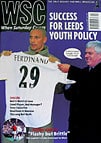 As Saltergate falls into disrepair, Chesterfield risk going under. Jonathan Westwood reports
As Saltergate falls into disrepair, Chesterfield risk going under. Jonathan Westwood reports
Older than the Football League itself and currently leading the Third Division, Chesterfield are the latest club to find themselves staring extinction in the face. Home to the club since 1884, Saltergate is one of the oldest football venues in the world and it shows its age. Only the main stand has seating and the away end remains open to the elements.
By mid-December the Football Licensing Authority may have sounded the death knell for the stadium and the club. If chairman Darren Brown fails to convince the FLA of the merits of his case, three sides of Saltergate will close after the home match with Hartlepool on December 30 and, due to the estimated cost of bringing them up to scratch, they would surely never reopen.
It is ten years since the Taylor Report, plenty of time for Chesterfield to have put their ground in order or moved. For once, though, the fans are not clamouring for the chairman’s resignation, arguing that this mess has been created not by Brown’s mismanagement but that of Norton Lea, chairman until last summer and now linked with a takeover of Bury.
Lea talked for years about leaving Saltergate, surrounded on all sides by roads and houses, for a new stadium outside the town centre at Wheeldon Mill. But he never quite got round either to buying the site or getting planning permission for his development, which initially resembled a shopping and cinema complex more than a football ground. The proceeds of the 1997 FA Cup run and the sale of Kevin Davies were never obviously used to benefit the club. Starved of investment, last season’s relegation became inevitable.
In just six months Brown has revitalised the club. The club’s commercial operations became truly commercial, opening a new club shop in the town centre (and selling out of replica shirts on its opening day). Brown announced he had agreed a purchase price for Wheeldon Mill and new plans were submitted to the council. Attendances rose as new manager Nicky Law’s team climbed the table.
In mid-November, however, local property developer Frank Sissons and partner Richard Cannon beat the club to the Wheeldon Mill site. Brown subsequently offered Sissons and Cannon 20 per cent more than the £466,000 already agreed with the original owners; he was told to come back with a “realistic” offer. Alternatively, Sissons suggested, Chesterfield could lease the land from him or he could build the new stadium himself. These generous offers were politely declined.
In other times the club could have started looking for another new home, as Brown is indeed trying to do. But when Lea shuffled away last summer the FLA declared Saltergate unfit and said that unless it was renovated or relocation was under way by December 31, only the main stand would be allowed to remain open. In six weeks’ time Saltergate’s capacity could be cut to 2,500, 88 per cent of which would go to season ticket holders. With just 300 tickets on sale each fortnight (and 250 of them going to away fans), Chesterfield would quickly face insolvency.
This is hardly a unique case, of course. Many others have been there and done that. Again, the grassroots are mobilising. Fans organised a petition at a recent FA Cup tie to present to the FLA, collecting over 1,000 signatures. An equivalent on the internet quickly drew hundreds of supportive messages from fans of other clubs, including Brighton, Barnet and local rivals Mansfield. Some rival clubs, however, are concerned that Chesterfield have received an unfair advantage on the pitch by splashing out on new players rather than investing in statutory safety measures.
Be that as it may, Saltergate is no worse, and in some cases better, than the grounds of many similar clubs. A billion Skypounds are about to pour into the Premiership. Chesterfield need about 0.0001 per cent of that sum. Instead it seems quite likely that players, management and fans will be made to suffer for the failings of a former administration.
From WSC 167 January 2001. What was happening this month